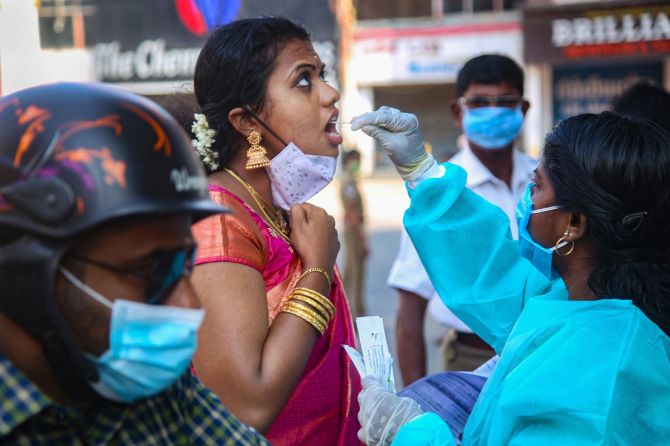'In the earlier waves, doubling of cases was happening at an interval of 4-6 days.'
'But in the case of omicron the doubling time we are seeing is in the range of 2-4 days.'

While vaccination data on the CoWin dashboard and Insacog's database of genome sequencing of the virus are well-managed, Covid testing data still is an area of concern in India, according to veteran microbiologist Dr Gagandeep Kang.
'When it comes to the testing database, it's a blackhole. The CoWin dashboard is an incredible feat given the scale of our vaccination efforts,' Dr Kang told Biocon Chairperson Kiran Mazumdar-Shaw in a Webinar.
India has taken more than 699 million samples for testing from the beginning of the pandemic up to January 13, according to data gathered by the Indian Council of Medical Research.
Meanwhile, more than 1.55 billion doses of vaccination had been administered in the country as of January 14 morning, according to data from the ministry of health and family welfare.
With the third of the pandemic ravaging across the country, there were more than 1.2 million active cases of Covid recorded on the day.
"If you want information on how vaccines are actually performing, linking those databases is critical. Despite highlighting repeatedly, it has not been done.
'It will be still fantastic even now if those siloed databases are linked as Covid is not going away anytime soon,' said Dr Kang who is a professor in the Department of Gastrointestinal Sciences at the Christian Medical College, Vellore.
According to her, private institutions should be allowed to do genome sequencing as the world is moving towards precision medicine - and that requires a lot more data.
Intermittent lockdowns and night curfews are just knee-jerk reactions by local authorities without any statistical evidence that such measures help in containing the spread of the virus, she said.
'In the earlier waves, doubling of cases was happening at an interval of 4-6 days. But in the case of omicron the doubling time we are seeing is in the range of 2-4 days,' Dr Kang pointed out.
'So, isolation (for anybody who came in contact with a Covid positive patient) of five days is okay now.'
On the question of whether booster doses should be of the same vaccine as the first two doses, she said data shows heterogeneous approaches are at least as good as or sometimes better than homologous vaccines.
'I think we have to remember the vaccines have been incredibly successful. They have all done reasonably well although we know now that the MRnA ones are better,' Dr Kang said.
'But we should just throw out the idea of permanent protection,' Dr Kang added.
While two doses of Covid vaccines have been seen to provide a good measure of immunity within a timeframe of six months, Dr Kang warned that the immunity does not fall off a cliff after the time period and it continues to give some amount of protection.
'If no other variant emergens with immune escape, we expect travel to open up in 2022-2023... We have seen five waves of the pandemic whereas India is amid its third wave currently,' Dr Kang said.
'We have been very lucky that the Covid variants have replicated only in the upper respiratory tract (and not to other parts of the body).'
Feature Presentation: Ashish Narsale/Rediff.com











